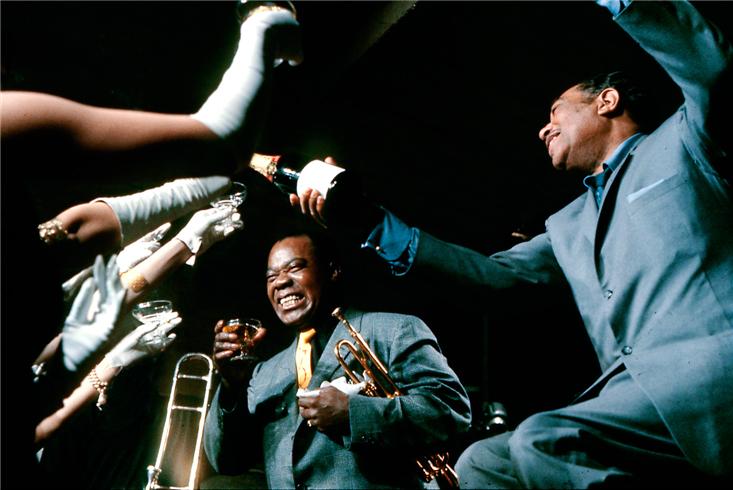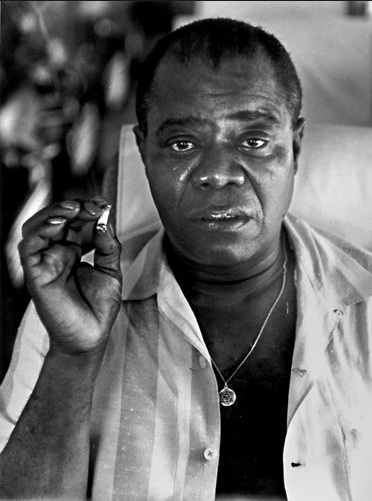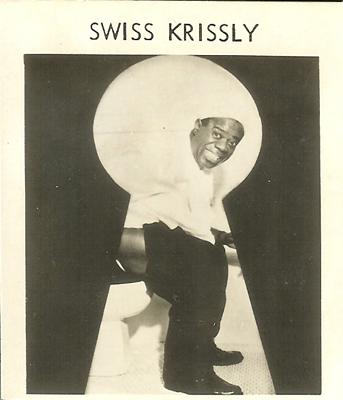“He who comes up to his own idea of greatness, must always have had a very low standard of it in his mind.”
William Hazlitt, Table Talk
Archives for 2014
See me, hear me (cont’d)
 • If you live in the Baltimore area, I’ll be speaking about Duke Ellington tonight at 6:30 in the Poe Room of the Enoch Pratt Free Library, located on 400 Cathedral Street, in which I spent many happy hours doing research in the Mencken Room once upon a time.
• If you live in the Baltimore area, I’ll be speaking about Duke Ellington tonight at 6:30 in the Poe Room of the Enoch Pratt Free Library, located on 400 Cathedral Street, in which I spent many happy hours doing research in the Mencken Room once upon a time.
For more information, go here.
• I recently taped an episode of Theater Talk with John Douglas Thompson, the star of Satchmo at the Waldorf. It’ll be airing on Channel 13, New York’s PBS affiliate, on Friday at one a.m. and on CUNY-TV, the station of the City of the University of New York, on Saturday at eight-thirty p.m, with four more replays on Sunday and Monday.
For a complete listing of air times for the episode, go here.
Snapshot: Jerome Robbins’ The Concert
An excerpt from Jerome Robbins’ The Concert (or the Perils of Everybody), set to the music of Chopin and danced by the Paris Opera Ballet:
(This is the latest in a series of arts-related videos that appear in this space each Monday and Wednesday.)
Almanac: Isaac D’Israeli on imperfection and greatness
“The defects of great men are the consolation of the dunces.”
Isaac D’Israeli, Essay on the Literary Character
Lookback: on dark and light art
From 2004:
I do think, however, that under the aspect of modernism, we’re taught to distrust happiness, at least as represented in art (and probably also in life as well). I myself don’t feel this way, which is why I gravitate to a great many artists whose view of the world is essentially sunny. On the other hand, that doesn’t stop me from embracing the dark side of art, so long as it isn’t ponderously dark. Even darkness can be “light,” like The Great Gatsby, Mozart in a minor key, or Bonnard at his most obsessive….
Read the whole thing here.
Almanac: Hazlitt on perfectionism
“Those who aim at faultless regularity will only produce mediocrity, and no one ever approaches perfection except by stealth, and unknown to themselves.”
William Hazlitt, “Thoughts on Taste”
A very rare memory of Louis Armstrong
I had occasion over the weekend to read Lyn Murray’s Musician: A Hollywood Journal, whose second subtitle is “Of Wives, Women, Writers, Lawyers, Directors, Producers and Music.” Published in 1987, it’s a gossipy diary that Murray, who wrote music for TV, films, and radio, kept between 1947 and 1983. While the book is as forgotten as its author–Murray only scored one film of any distinction, Alfred Hitchcock’s To Catch a Thief–it’s full of fascinating tales about better-known people.
 One of them is Louis Armstrong, which whom Murray worked on a couple of widely separated occasions. Had I read Musician prior to writing Pops: A Life of Louis Armstrong, I would certainly have quoted from the following entries, which are, so far as I’m aware, unknown to jazz scholars.
One of them is Louis Armstrong, which whom Murray worked on a couple of widely separated occasions. Had I read Musician prior to writing Pops: A Life of Louis Armstrong, I would certainly have quoted from the following entries, which are, so far as I’m aware, unknown to jazz scholars.
* * *
Wednesday, Sept. 15, 1954 I haven’t seen Louie for 19 years. In 1935 we made some records for Decca. “Shadrack” was one. A big hit. We made friends on that date and we corresponded for awhile–his letters, most amusing, came from all over the country and were done in elite type. Big thrill for me. Louie is a wonderful, original man. His autobiography Satchmo is out now. He is working on a sequel and let us read a chapter (in elite type). The chapter we read deals with marijuana. He smokes it every day and feels that J. Edgar Hoover is wrong to put it on the same level as hard stuff like heroin and cocaine. He says his book wouldn’t be honest if he didn’t talk about “shuzzit” (his name for marijuana), since he has blasted with hundreds of friends all his life. To preserve his health and happiness his mother told him to do three things: gargle, move your bowles (that’s Louie’s spelling) and smoke a stick of gage (marijuana) every day….
 Friday, Sept. 17, 1954 Sid [Kuller] and I had a breakfast date with Louie in his [Las Vegas] bungalow at three p.m. Colored acts are not allowed to stay at the Sands so we went up the Strip a hundred yards to the Bon Aire Motel. He was in #7 naturally. We knocked on the door. Miss Lucille Preston his secretary [and girlfriend] opened it a crack, saw who we were and invited us in. Louie was in the bathroom following his mother’s advice, gargling, moving his bowles and smoking. The air in the bungalow was nice and thick. He came out of the bathroom with a white towel round his head (he wears it in his dressing room between and after shows), a pair of nylon shorts, which didn’t quite cover everything, around his loins. He gave us a big happy greeting, led us into the kitchen and presented us with two B-52s [large joints] which we lit up. The tape machine was going. He had his supply of “shuzzit” in a Sucrets can. At one point he went into the bathroom and came out with a herbal laxative called Swiss Kriss. He said it was basically “gage” and it was good to stretch out the real stuff if you were running short. Velma Middleton [the female singer for Armstrong’s All Stars] came in with a perfectly beautiful little girl, daughter of Trummie [Trummy] Young the trombone player [for the All Stars]. Louie gave the child one of those dime slot machine banks. The back door of the bungalow was open so the little girl didn’t get high….
Friday, Sept. 17, 1954 Sid [Kuller] and I had a breakfast date with Louie in his [Las Vegas] bungalow at three p.m. Colored acts are not allowed to stay at the Sands so we went up the Strip a hundred yards to the Bon Aire Motel. He was in #7 naturally. We knocked on the door. Miss Lucille Preston his secretary [and girlfriend] opened it a crack, saw who we were and invited us in. Louie was in the bathroom following his mother’s advice, gargling, moving his bowles and smoking. The air in the bungalow was nice and thick. He came out of the bathroom with a white towel round his head (he wears it in his dressing room between and after shows), a pair of nylon shorts, which didn’t quite cover everything, around his loins. He gave us a big happy greeting, led us into the kitchen and presented us with two B-52s [large joints] which we lit up. The tape machine was going. He had his supply of “shuzzit” in a Sucrets can. At one point he went into the bathroom and came out with a herbal laxative called Swiss Kriss. He said it was basically “gage” and it was good to stretch out the real stuff if you were running short. Velma Middleton [the female singer for Armstrong’s All Stars] came in with a perfectly beautiful little girl, daughter of Trummie [Trummy] Young the trombone player [for the All Stars]. Louie gave the child one of those dime slot machine banks. The back door of the bungalow was open so the little girl didn’t get high….
Just because: Richard Strauss conducts Till Eulenspiegel
Richard Strauss conducts the Vienna Philharmonic in a 1944 performance of excerpts from his Till Eulenspiegel’s Merry Pranks. (These unedited single-camera takes were subsequently edited into a documentary film.) The video ends with an unrelated silent film of Arthur Nikisch conducting what is believed to be Tchaikovsky’s Sixth Symphony:
(This is the latest in a series of arts-related videos that appear in this space each Monday and Wednesday.)
